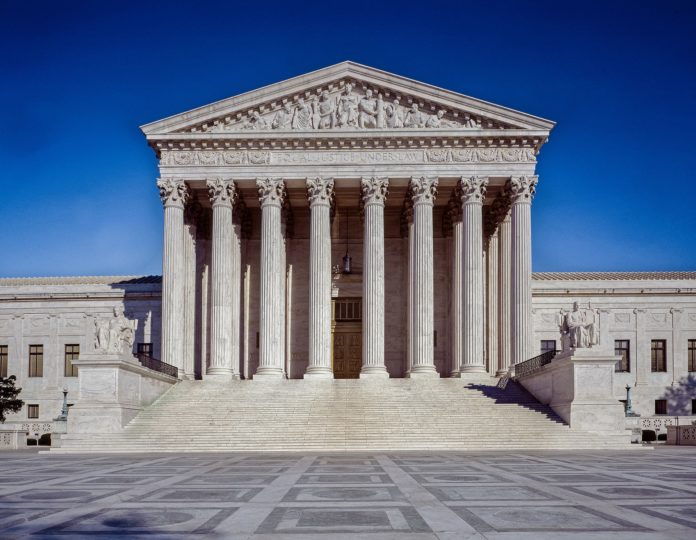

On Friday, the U.S. Supreme Court overturned abortion protections created by its 1973 decision in Roe v. Wade.
One of the most watched cases of this session, the court’s June 24 decision in Dobbs v. Jackson Women’s Health overturned court precedent and ruled that the U.S. Constitution doesn’t provide a right to have an abortion and added that elected officials have the authority to regulate the procedure.
A leaked draft opinion of Dobbs v. Jackson released earlier this year suggested the court was set to overturn Roe and its companion case, Casey v. Planned Parenthood. But now that the court has officially overturned the cases, states will be free to pass and enforce laws restricting abortion access.
Writing for the court’s conservative majority, Justice Samuel Alito criticized the court’s original reasoning in Roe, taking jabs at portions of opinion, including its lengthy review of history which he called mostly “irrelevant” and the inclusion of case law that Alito said didn’t pertain to the issues. “Not only did this scheme resemble the work of a legislature, but the court made little effort to explain how these rules could be deduced from any of the sources on which constitutional decisions are usually based,” wrote Alito.
Alito also took issue with some of the lines drawn in Roe, particularly how and why the court reasoned some portions of a pregnancy’s term could be regulated by states and others couldn’t. Fetus viability wasn’t well supported in Roe, Alito wrote, and the court’s opinion opened many other questions.
“All in all, Roe’s reasoning was exceedingly weak, and academic commentators, including those who agreed with the decision as a matter of policy, were unsparing in their criticism,” Alito added. When the court upheld Roe in its 1992 Casey decision, Alito said it failed to address inconsistencies in the original opinion.
Alito addressed the public backlash that came out of the court’s recent decision, writing that he understood the American public may lose faith in the U.S. Supreme Court’s decision over a “watershed” issue, adding it may appear like the court was influenced by political pressure or personal views of the justices.
“We do not pretend to know how our political system or society will respond to today’s decision overruling Roe and Casey,” wrote Alito. “And even if we could foresee what will happen, we would have no authority to let that knowledge influence our decision. We can only do our job, which is to interpret the law, apply long standing principles of stare decisis, and decide this case accordingly.”
Alito was joined by Justices John Roberts, Neil Gorsuch and Amy Coney Barrett with Justices Clarence Thomas and Brett Kavanaugh writing separate concurrences.
The court’s three justice minority — Justices Stephen Breyer, Sonia Sotomayor and Elena Kagan — dissented.
“For half a century, Roe v. Wade and Planned Parenthood of Southeastern Pa. v. Casey have protected the liberty and equality of women. Roe held, and Casey reaffirmed, that the Constitution safeguards a woman’s right to decide for herself whether to bear a child,” the dissent explained. “Respecting a woman as an autonomous being, and granting her full equality, meant giving her substantial choice over this most personal and most consequential of all life decisions.”
The minority critiqued the court’s decision, writing that in overturning Roe, the court was waiving a woman’s rights from the moment of conception. The three justices warned that states have, and will likely continue, to pass restrictive abortion laws that don’t make exception for cases of rape, incest or an unviable fetus. Enforcement, they added, will also be left to the states and could mean harsh penalties for people who help women obtain abortions across state lines.
“Yesterday, the Constitution guaranteed that a woman confronted with an unplanned pregnancy could (within reasonable limits) make her own decision about whether to bear a child, with all the life-transforming consequences that act involves. And in thus safeguarding each woman’s reproductive freedom, the Constitution also protected ‘[t]he ability of women to participate equally in [this Nation’s] economic and social life,'” wrote the minority. “But no longer. As of today, this Court holds, a State can always force a woman to give birth, prohibiting even the earliest abortions.”
The U.S. Supreme Court has been the subject of increasing public scrutiny over the last several years and calls for reform, including term limits, increased transparency and the creation of a code of ethics.
The court’s latest decision, which overturned the most-well known Supreme Court case amongst the American public, will without a doubt add fuel to the current flames.

